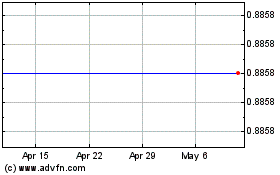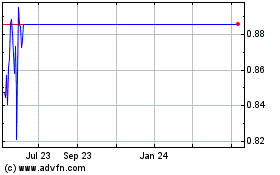Glencore Shares Regain More Lost Ground
October 01 2015 - 5:40AM
Dow Jones News
LONDON—Glencore PLC shares have recouped the ground they lost in
heavy selling earlier this week, vindicating management's efforts
to restore confidence in the commodities group's finances amid weak
commodities prices.
Shares in the Swiss commodities trader and producer rose more
than 8% to an intraday high of 99.17 pence a share for the first
time since Monday's 29% share-price rout. Shares have since fallen
back a little but are outperforming the broader mining sector and
London market.
Glencore's communications offensive involved repeated messages
to investors on Tuesday and Wednesday that it faced no risk of
insolvency while it pressed ahead with plans to reduce net debt of
nearly $30 billion.
One new option that has emerged is selling a stake in its
agricultural business, though that would be painful. The
agricultural arm's earnings before interest and taxes last year was
$856 million for Glencore, almost a third of its marketing
division's profit, according to the company's annual report.
Glencore has hired Citigroup Inc. and Credit Suisse Group AG to
sell the business, people familiar with the matter said.
"Glencore has taken proactive steps to position our company to
withstand current commodity-market conditions," the company said in
the statements earlier this week.
The company announce earlier this month it was suspending future
dividend payments, issuing equity and selling assets to reduce net
debt to around $20 billion by the end of 2016.
Despite an initially favorable reaction from investors to the
debt-reduction plan, sentiment turned sour amid continued falls in
raw-materials prices to which Glencore is exposed as a major
producer of coal and base metals as well as one of the world's
biggest commodities traders. More broadly, investors are
increasingly worried about the scale of corporate debt world-wide
as the outlook for earnings growth darkens.
Concerns centered on Glencore's capacity to safeguard its
investment-grade credit rating unless it took greater measures to
cut back debt particularly if commodity prices remained lower for
longer amid a gloomy outlook for the economy in China, the major
consumer of coal, copper and nickel among other commodities.
Losing investment-grade status would severely constrain
Glencore's borrowing and its trading arm would have to curtail its
activities significantly.
Glencore's shares are still down around 68% this year, making it
the worst performer out of the U.K.'s FTSE 100 index. They are down
more than 80% since listing its shares in London in 2011.
The stock-price plunge has highlighted problems investors see in
Glencore's business model, which combines a massive trading
division that buys and sells commodities with a mining arm that
produces those materials. The combination was supposed to make
Glencore less susceptible to commodity-price downturns, but the
amount of borrowing needed to run a trading house has alarmed
investors as the company's earnings and share price have
fallen.
Prices for the main commodities that drive Glencore's revenue --
copper, coal, zinc and nickel, among others -- have all hit
multiyear lows in recent months.
Write to Alex MacDonald at alex.macdonald@wsj.com
Access Investor Kit for "CitiGroup Inc"
Visit
http://www.companyspotlight.com/partner?cp_code=P479&isin=US1729674242
Subscribe to WSJ: http://online.wsj.com?mod=djnwires
(END) Dow Jones Newswires
October 01, 2015 05:25 ET (09:25 GMT)
Copyright (c) 2015 Dow Jones & Company, Inc.
Credit Suisse (NYSE:CS)
Historical Stock Chart
From Mar 2024 to Apr 2024

Credit Suisse (NYSE:CS)
Historical Stock Chart
From Apr 2023 to Apr 2024
